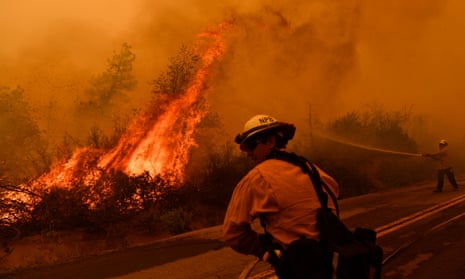The impacts of the climate crisis are proving much worse than predicted, and governments must act more urgently to adapt to them or face global disaster, the UK president of the UN climate talks has warned on the eve of a landmark new scientific assessment of the climate.
Alok Sharma, who led the Cop26 climate summit last year, said: “The changes in the climate we are seeing today are affecting us much sooner and are greater than we originally thought. The impacts on our daily lives will be increasingly severe and stark. We will be doing ourselves and our populations a huge disservice if we fail to prepare now, based on the very clear science before us.”
In a report to be published on Monday, the Intergovernmental Panel on Climate Change (IPCC) is expected to show that droughts, floods and heatwaves will increase in frequency and intensity, with devastating consequences, and all parts of the globe will be affected.
Sharma also said climate talks must continue this year at international forums such as the G20, despite Russia’s invasion of Ukraine. Russia is a member of the G20, after being ejected from the G8 over its annexation of Crimea. Sharma said he spoke to his Russian counterpart some weeks ago before the current escalation, but they have not spoken since.
More than seven years in the making, and drawing on the work of thousands of scientists, the latest report from the IPCC – the UN-convened body of the world’s leading climate scientists – is expected to show climate breakdown is pushing the world close to the brink of catastrophic change, and urgent work is needed to protect against drastic impacts that are now inevitable and in some cases already happening.
Speaking before the publication, Sharma told the Guardian: “Based on the science [of recent years], there is an expectation that the report will tell us that over the past decade, climate change impacts have been much greater than anticipated. Policymakers need to see this as another wake-up call to take action now.”
He added: “Countries need to take action now. If we don’t take action now, the costs will be much higher, and the impacts higher, in future years.”
Sharma pointed out that at Cop26 governments of rich countries agreed to double their aid to the poor world for adaptation to climate change by 2025. “We made more progress than previous Cops,” he said. Rich countries must also protect themselves, he added. “The UK is spending £5bn on the impacts of flooding, and preparing our national adaptation plan.”
Some of the IPCC’s findings are likely to be politically controversial. One of the biggest bones of contention at Glasgow was over “loss and damage”, referring to the worst impacts of the crisis, which cannot be adapted to – such as villages being swept away by hurricanes, or land lost to rising seas.
Poor countries want the rich world to recognise the loss and damage they suffer, and provide funding accordingly. But rich countries, already falling behind on a longstanding pledge to provide $100bn (£75bn) a year to help poor nations cut emissions and adapt to climate impacts, have been slow to agree to any additional finance.
Some developing countries and civil society groups are calling for action this year, ahead of Cop27. Sharma dampened those hopes, pointing to an agreement at Cop26 to set up a four-year programme examining loss and damage called the “Glasgow dialogue”. He said: “Countries have been asked to make formal submissions on all this … We have to see how those discussions go, where that dialogue takes us.”
Monday’s IPCC publication is the second of four parts of the “sixth assessment report”, the latest in a series of comprehensive summaries of the world’s knowledge of the climate, stretching back to 1988. The first part, published last August, showed that climate change was unequivocally the result of human actions and was causing “unprecedented” and in some cases “irreversible” changes. A third part, to be published in April, will set out the means of dealing with the crisis, such as investing in renewable energy and novel technologies such as carbon capture, and this October a summary of all three parts will draw together the lessons for policymakers before the Cop27 summit.
As IPCC reports take between five and seven years to compile, the current assessment is likely to be the last while there is still time to stave off the worst ravages of climate breakdown. Emissions must halve by 2030, to stay within 1.5C, the IPCC has previously warned, but after the plunge caused by the lockdowns global carbon dioxide emissions have bounced back and are set to rise strongly again this year.
